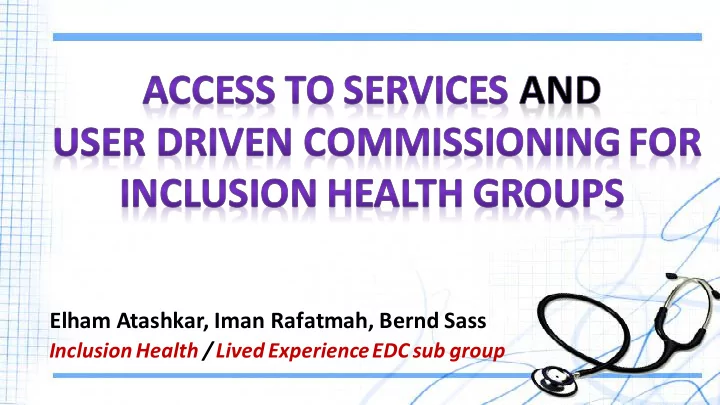

Elham Atashkar, Iman Rafatmah, Bernd Sass Inclusion Health / Lived Experience EDC sub group
‘ Inclusion Health’ is about supporting those who are ‘excluded’ in society and • ‘marginalised’ from mainstream services • ‘Inclusion Health Groups’ are not usually best served by healthcare services, and have significantly poorer health outcomes. • Traditional definitions cover people who are homeless, vulnerable migrants (refugees and asylum seekers), sex workers, and those from the Traveller community (including Gypsies and Roma) • Our definition of those in scope is kept under constant and regular review. • NHS England’s working definition also includes those undergoing or surviving Female Genital Mutilation (FGM) and Human Trafficking, those who define themselves as being part of a recovery movement, and the trans/non-binary community - an interim protocol for gender identity services is in place and the service specification is under review.
EDC Inclusion Health & Lived Experience Sub-group Purpose: To tackle health inequalities and advance equality for all Vision: Ensuring those who experience multiple disadvantage and discrimination get a fair deal from the NHS with early access to appropriate healthcare services to begin to narrow the health inequalities gaps Purpose: To assist the shaping of the NHS from an equality, health inequalities and human rights perspective , working with people with to advance equity in access to improve health care experiences and outcomes for the most disadvantaged groups and those with protected characteristics by 2017.
The story remains the same – for those most at risk of inequality… here are some facts and figures. They remain constant …
Gypsy and Traveller communities have lowest life expectancy of any ethnic group in UK, high maternal and infant mortality rates; low child immunization levels, high rates of mental illness, suicides, diabetes and heart disease. Homeless people are over 9 x more likely to commit suicide than general population The average age of death of a rough sleepers is 30 years earlier than average population Two-thirds of refugees & asylum seekers suffer om anxiety or depression and PTSD is underdiagnosed (Sources: DH Ministerial working group 2012, Crisis 2012, Faculty of Public Health, 2008)
Quotes from people of Lived Experience at Expo 2015 ‘ It happens to us : Invisibility , marginalisation , denial of access to care . People with of social exclusion in healthcare - Nothing about us without us !’ • ‘You can't design services for groups of people whose lives , needs , assets and health issues are an ‘ unknown ’’ • ‘ You can't speak in your own language and assume it's universal – whether that be the language of professionals, the language of acronyms, or the English language ...’
GPs to allow us to register and without breaching our confidentiality at reception desks (e.g. calling out ‘ she/he is an asylum seeker ’ in front of all the patients) Interpreters and volunteer support Culturally sensitive services Support with post traumatic stress and mental wellbeing Less confusion in the system about registration (former NHS Protect Guidance and confusion post-charging policy) LESS HOSTILITY AND RESENTMENT
NHS England Refugee & Asylum seeker health pilot in the North West. ‘ Hub and spoke ’ model. The GPs and health professionals will be ‘ an alliance of the willing ’! A Specialist GP to advise other GPs across the North West on how to work with refugees and asylum seekers It will have appropriate health services, wrapped around by volunteer support- health buddies, mentors, people to help us navigate the system, write letters. Help to register – clear information about access to healthcare . We are trialling a leaflet. This dovetails with new GMC-approved guidance for clinicians.
Tried and tested approach to support, gather and translate of people’s pathways into experience and outcome measures for contracting. Example: 5-year CAMHS contract – 20% stake to group upfront
Co-facilitated group of children & YP with mental health problems (and carers) over 14 sessions in 8 months Shared life stories, mapping out risk and protective factors in feeling good - also taking into account peers as (peer) advocates Setting out vision for landscape of ideal services and paid (peer) support delivered at crucial ‘ pathway ’ points – step up/down Next, the group would take specific focus, for example on: a) experience and outcome measures – eg borrowing £5 b) procurement within commissioning cycle
EDC to focus on access to appropriate healthcare services for Inclusion Health groups and other equality groups facing big inequalities of access (e.g. disabled people) We will present a paper to EDC in January – the ‘ QUICK- WINS PROGRAMME ’ w hich will include: 1) Ideas for changes to national policy 2) National work to inform frontline staff and to empower patients with information e.g. leaflets and clear guidance on registering Inclusion Health groups, co-produced with homeless, Gypsies and Travellers, sex workers. 3) Developing user driven commissioning with people with ‘ ’ of inequality in access to services
We have highlighted ongoing problems with access and stigma felt on a day to day basis , despite many good intentions of people in the NHS and policies which may suggest on the face of it that ‘all is well’ What levers do the EDC system leaders have? What are the expectations of the health sector for Inclusion Health groups? How do we make this work?
How do we address the issue of contractual obligations versus the ‘custom and practice ‘of avoiding registering Inclusion Health groups? How can we challenge common misassumptions on the front line including; W e aren’t paid enough for these people – they have more needs! How can we convey that allocations are made on the basis of an ‘average’ cost of care for everyone, not on cherry picking the cheapest patients! How can we reinforce that Patient care is ‘for better or for worse, in sickness and in health, to look after everyone’s needs whatever the stage of life’. Tackling further issues on access to secondary care
Recommend
More recommend